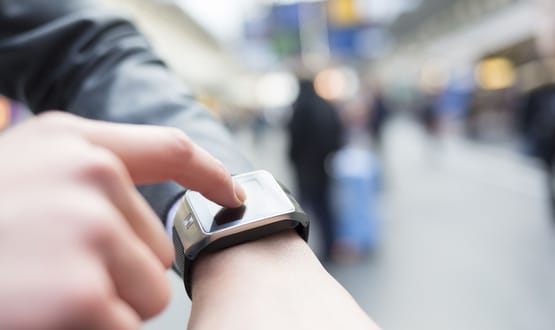University Hospitals Plymouth pioneers smart watches for Parkinson’s

University Hospitals Plymouth NHS Trust is working in conjunction with the University of Plymouth to develop the use of smart watches to monitor Parkinson’s patients at home.
Using a device, known as a Parkinson’s Kinetigraph (PKG), a patient’s movements can be closely monitored while they’re at home. Doctors can then assess the data gathered to looks for signs that interventions may be needed, such as changing medications or offering physiotherapy.
In addition, the watch buzzes to remind patients to take their medication to ensure they stay on top of their daily medication needs.
The device will provide doctors with a thorough review of patients’ health and ensure they receive the care they need, when they need it. They can view the data over the course of a week to help spot any potential issues such as excessive movement, immobility or sleep disturbances.
For users, the device gives peace of mind that symptoms are being monitored accurately, without relying on memory to keep track of any issues that may arise.
Healthcare innovation
The device has already been issued to hundreds of patients as part of the NHS Long Term Plan and its commitment to using advanced technology to benefit patients and healthcare professionals.
Health and social care secretary Sajid Javid said: “Making healthcare more accessible and personalised is at the centre of our plans for reform. For people living with degenerative diseases like Parkinson’s, it’s important to be able to communicate any changes in symptoms to your doctor quickly and easily.
“This is a fantastic example of how technology is driving cutting-edge innovation in healthcare, allowing remote monitoring of patients that can dramatically improve their quality of life and independence as well as freeing up valuable clinician time.”
Funding boost
The University Hospitals Plymouth project is one of 40 that has been backed by NHS Transformation’s Digital Health Partnership Award. This provides funding to accelerate the adoption of digital health technologies to support patients with long-term conditions.
As part of the award, University Hospitals Plymouth was given £500,000, which will be used to integrate the paper questionnaire, all of a patients’ data and the ability to contact their clinician, into the electronic record over the next year.
Dr Tim Ferris, NHS England’s director of transformation, said: “Thanks to NHS funding the work that was started by the team at Plymouth is now being taken to a new level of digital integration so that clinicians throughout the country caring for people with Parkinson’s can monitor their patient’s symptoms from their desktop without requiring them to fill in diaries and attend multiple outpatient’s appointments.”





2 Comments
I was diagnosed with Parkinson’s disease a year ago at the age of 67. For several months I had noticed tremors in my right hand and the shaking of my right foot when I was sitting. My normally beautiful cursive writing was now small cramped printing. And I tended to lose my balance. Neurologist had me walk down the hall and said I didn’t swing my right arm. I had never noticed! I was in denial for a while as there is no history in my family of parents and five older siblings, but I had to accept I had classic symptoms. I was taking amantadine and carbidopa/levodopa and was about to start physical therapy to strengthen muscles. Finally, I was introduced to Kycuyu Health Clinic and their effective Parkinson’s herbal protocol. This protocol relieved symptoms significantly, even better than the medications I was given. After First month on treatment, my tremors mysterious stopped, had improvement walking. After I completed the treatment, all symptoms were gone. I live a more productive life. I was fortunate to have the loving support of my husband and family. I make it a point to appreciate every day!
In your article you say that ‘the device has already been issued to hundreds of patients as part of the NHS Long Term Plan’, but as someone diagnosed myself I know lots of people who also have it, but none of us have even heard of this watch, let alone be given one.
Please can you tell me how people are being issued with them? How are they identified, and who chooses who should have one? And if we’re not issued with one, would we have to pay to see if they work for us? Or if we have been chosen, when can we expect to hear anything?
I hope you can tell me, or perhaps point me in the right direction if you don’t know.
Comments are closed.